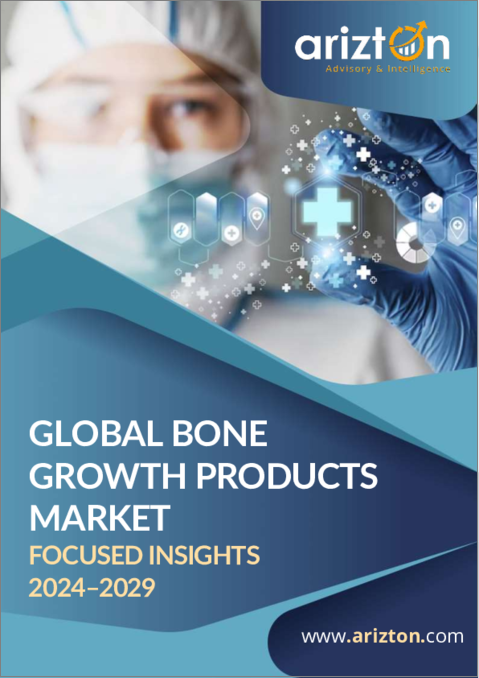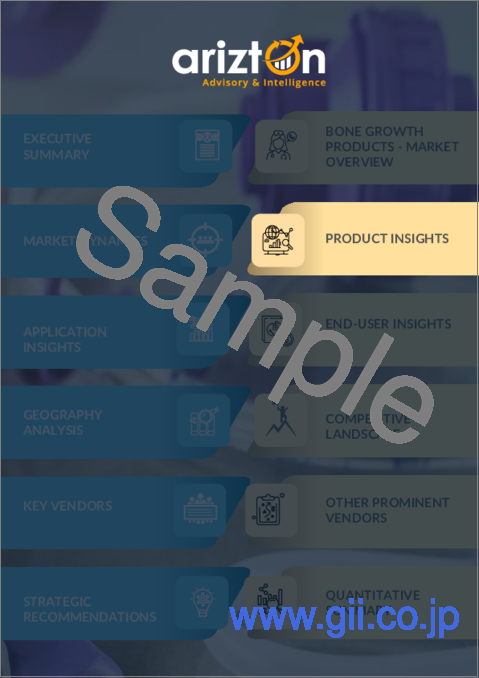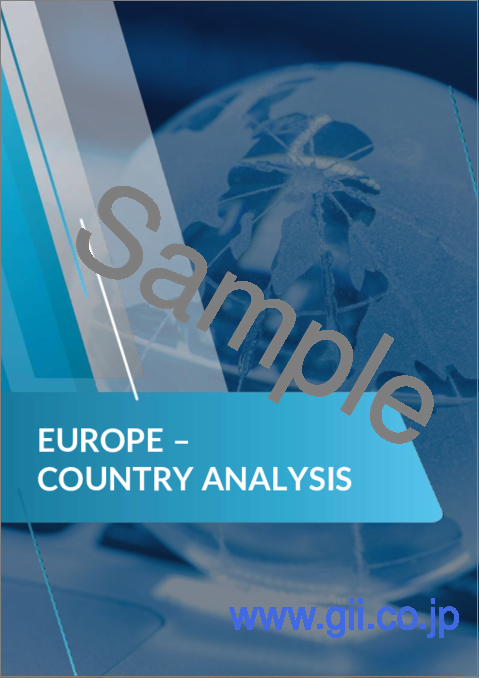|
|
市場調査レポート
商品コード
1580583
骨成長製品の世界市場 - Focused Insights(2024年~2029年)Global Bone Growth Products Market - Focused Insights 2024-2029 |
||||||
|
|||||||
| 骨成長製品の世界市場 - Focused Insights(2024年~2029年) |
|
出版日: 2024年10月28日
発行: Arizton Advisory & Intelligence
ページ情報: 英文 146 Pages
納期: 即納可能
|
全表示
- 概要
- 図表
- 目次
世界の骨成長製品の市場規模は、2023年~2029年にCAGRで3.72%の成長が見込まれます。
市場機会と促進要因
自己発電型植込み型装置の台頭
侵襲性骨成長刺激装置は、治癒していない骨折や骨癒合部位に電気エネルギーを供給する移植可能な装置であり、骨形成を誘導し、成長を刺激し、治癒を促進することを目的としています。これらの装置は、植え込まれたリードを通して供給される直流電流を使用し、骨折部位に一貫した電流を供給することで、非侵襲性システムに見られる患者のコンプライアンスに関する問題を克服しています。侵襲性刺激装置は、特に脛骨、大腿骨、上腕骨の非骨癒合に適応され、腰椎や仙骨の固定術を受ける高リスクの患者(固定術の失敗歴や喫煙、肥満、糖尿病などの疾患を有する患者を含む)に有効であることが証明されています。骨は圧電材料であるため、ひずみにより微小な電荷を発生し、治癒を助けます。このような装置の利点が高まっていることから、先進国での採用が増加しており、市場でのプレゼンスと有効性を高めるための研究が進められています。
脊椎固定と骨再生における骨形成タンパク質(BMP)の影響
トランスフォーミング増殖因子β(TGF-β)ファミリーの一部である骨形成タンパク質(BMP)は、特に脊椎固定術と骨再生において、自家骨移植に代わる有望な選択肢となっています。2002年に腰椎前方固定術用としてFDAに承認されたBMPは、従来の移植法よりも合併症が少なく、骨の治癒を促進することを目的としています。BMPは、腸骨稜移植片(ICBG)の固定率76%に対し、98%という高い有効性を示し、椎体間固定、後側方固定、円周方向固定などのさまざまな脊椎固定術に用いられています。BMPは、安全性と有効性においてICBGに匹敵し、脊椎後方固定術や頸椎固定術などの適応外使用にも拡大しつつあります。BMPは、FGF、PDGF、IGFなどのその他の生物学的因子とともに、骨再生の促進に重要な役割を果たしています。整形外科手術では自家移植が依然として標準ですが、BMPはよく研究された効果的な代替手段を提供します。
生体適合性合成骨移植片と生物製剤の採用の高まり
生体適合性のある合成骨移植片と生物製剤の使用の増加は、骨成長製品市場の主な促進要因です。セラミック、ポリマー、複合材料などの材料から作られる合成骨移植片は、天然の骨構造を模倣し、新しい骨の成長への足場を提供する一方で、同種移植片や自家移植片に関連する疾患伝播や免疫拒絶反応のリスクを低減します。これらの移植片は、特に脊椎固定術や外傷症例に需要があります。骨形成タンパク質(BMP)や多血小板血漿(PRP)などの生物製剤は、細胞活性と骨成長を促進することにより、骨の自然治癒を促進します。BMPは骨形成を誘導して複雑骨折の転帰を改善し、PRPは治癒を促進します。これらの技術革新は骨損傷の治療に変革をもたらし、より効果的で効率的かつ個別化されたソリューションを提供しており、医療提供者がより安全で費用対効果の高い選択肢を求めるにつれて、市場成長を促進しています。
業界の抑制要因
急速な技術の進歩への対応
骨成長刺激装置は高価であり、保険が適用されないことが多いため、多くの人々が理学療法、アーユルヴェーダ、カイロプラクティックのような手頃な代替療法を求めるようになります。高い費用対効果により、これらの代替医療は日本、中国、インドなどの地域で人気があります。さらに、骨刺激装置による不快感や整形外科医の不足は、患者を伝統的な治療へと向かわせます。認知度の拡大、治療アクセスの改善、保険適用の拡大は、低中所得地域における骨成長製品の採用を後押しする可能性があります。
競合情勢
市場は競争が激しく、Medtronic、Johnson & Johnson、Stryker、Zimmer Biometなどのグローバル企業が買収、提携、新製品の投入を通じてリードしています。中小企業の参入も増えており、斬新で費用対効果の高い製品に注目が集まっています。特に高齢者や糖尿病患者の骨再生における課題に対処するため、パルス電磁場療法などの先進の骨治癒療法の開発が重視されるようになっています。Bioventus、Orthofix、Terumoなどの主要企業は、革新的なソリューションで製品ポートフォリオを強化しています。
主要ベンダー
- Bioventus
- Enovis Corp
- Johnson & Johnson
- Medtronic
- Orthofix
- Stryker Corp
- Zimmer Biomet
その他の著名ベンダー
- Altis Biologics
- Bio-Dynamic Technologies
- BTT Health
- Cellumed
- Elizur
- EmCyte
- Fintek Bio-Electric
- IGEA
- ITO
- Kinex Medical
- Ossatec Benelux
- Pain Rehab Products
- Royal Biologics
- Fujifilm Corp
- Smith & Nephew
- Specialized Orthopedic Solutions
- Stimulate Health
- Terumo
- Globus Medical
- ATEC
- Moximed
- Anika Therapeutics
- Highridge Medical
当レポートでは、世界の骨成長製品市場について調査分析し、各地域の収益と予測、見通しと機会、競合情勢などを提供しています。
目次
第1章 骨成長製品市場の概要
- エグゼクティブサマリー
- 主な調査結果
第2章 骨成長製品市場
第3章 骨成長製品市場セグメンテーションデータ
- 世界の収益の予測:製品別
- 骨成長刺激装置
- 骨形成タンパク質
- 多血小板血漿
- 世界の収益の予測:用途別
- 脊椎固定術
- 口腔・顎顔面手術
- 癒合遅延・癒合不全骨折
- その他
- 世界の収益の予測:エンドユーザー別
- 病院・診療所
- 専門整形外科・脊椎センター
- 外来手術センター(ASC)
第4章 主要地域の概要
- 北米の骨成長製品市場の収益の予測
- 米国の骨成長製品市場の収益の予測
- カナダの骨成長製品市場の収益の予測
- 欧州の骨成長製品市場の収益の予測
- ドイツの骨成長製品市場の収益の予測
- フランスの骨成長製品市場の収益の予測
- 英国の骨成長製品市場の収益の予測
- イタリアの骨成長製品市場の収益の予測
- スペインの骨成長製品市場の収益の予測
- アジア太平洋の骨成長製品市場の収益の予測
- 中国の骨成長製品市場の収益の予測
- 日本の骨成長製品市場の収益の予測
- インドの骨成長製品市場の収益の予測
- オーストラリアの骨成長製品市場の収益の予測
- 韓国の骨成長製品市場の収益の予測
- ラテンアメリカの骨成長製品市場の収益の予測
- ブラジルの骨成長製品市場の収益の予測
- メキシコの骨成長製品市場の収益の予測
- アルゼンチンの骨成長製品市場の収益の予測
- 中東・アフリカの骨成長製品市場の収益の予測
- トルコの骨成長製品市場の収益の予測
- サウジアラビアの骨成長製品市場の収益の予測
- 南アフリカの骨成長製品市場の収益の予測
第5章 骨成長製品市場の見通しと機会
- 骨成長製品市場の機会と動向
- 骨成長製品市場の促進要因
- 骨成長製品市場の抑制要因
第6章 骨成長製品産業の概要
- 骨成長製品市場 - 競合情勢
- 骨成長製品市場 - 主要ベンダーのプロファイル
- 骨成長製品市場 - その他の著名ベンダー
- 骨成長製品市場 - 主な戦略的推奨事項
第7章 付録
LIST OF EXHIBITS
Exhibit 1: Projected Revenues of Global Bone Growth Products (2020-2029, $ MN)
Exhibit 2: Market Size & Forecast - Bone Growth Stimulator Devices (2020-2029, $ MN)
Exhibit 3: Market Size & Forecast - Bone Morphogenetic Protein (2020-2029, $ MN)
Exhibit 4: Market Size & Forecast - Platelet Rich Plasma (2020-2029, $ MN)
Exhibit 5: Market Size & Forecast - Spinal Fusion Surgeries (2020-2029, $ MN)
Exhibit 6: Market Size & Forecast - Oral & Maxillofacial Surgeries (2020-2029, $ MN)
Exhibit 7: Market Size & Forecast - Delayed Union & Non-union Bone Fractures (2020-2029, $ MN)
Exhibit 8: Market Size & Forecast - Others (2020-2029, $ MN)
Exhibit 9: Market Size & Forecast - Hospitals & Clinics (2020-2029, $ MN)
Exhibit 10: Market Size & Forecast - Specialty Orthopedic & Spine Centers (2020-2029, $ MN)
Exhibit 11: Market Size & Forecast - Ambulatory Surgical Centers (ASCs) (2020-2029, $ MN)
Exhibit 12: Projected Revenues of Bone Growth Products in North America (2020-2029, $ MN)
Exhibit 13: Projected Revenues of Bone Growth Products in the US (2020-2029, $ MN)
Exhibit 14: Projected Revenues of Bone Growth Products in Canada (2020-2029, $ MN)
Exhibit 15: Projected Revenues of Bone Growth Products in Europe (2020-2029, $ MN)
Exhibit 16: Projected Revenues of Bone Growth Products in Germany (2020-2029, $ MN)
Exhibit 17: Projected Revenues of Bone Growth Products in France (2020-2029, $ MN)
Exhibit 18: Projected Revenues of Bone Growth Products in the UK (2020-2029, $ MN)
Exhibit 19: Projected Revenues of Bone Growth Products in Italy (2020-2029, $ MN)
Exhibit 20: Projected Revenues of Bone Growth Products in Spain (2020-2029, $ MN)
Exhibit 21: Projected Revenues of Bone Growth Products in APAC (2020-2029, $ MN)
Exhibit 22: Projected Revenues of Bone Growth Products in China (2020-2029, $ MN)
Exhibit 23: Projected Revenues of Bone Growth Products in Japan (2020-2029, $ MN)
Exhibit 24: Projected Revenues of Bone Growth Products in India (2020-2029, $ MN)
Exhibit 25: Projected Revenues of Bone Growth Products in Australia (2020-2029, $ MN)
Exhibit 26: Projected Revenues of Bone Growth Products in South Korea (2020-2029, $ MN)
Exhibit 27: Projected Revenues of Bone Growth Products in Latin America (2020-2029, $ MN)
Exhibit 28: Projected Revenues of Bone Growth Products in Brazil (2020-2029, $ MN)
Exhibit 29: Projected Revenues of Bone Growth Products in Mexico (2020-2029, $ MN)
Exhibit 30: Projected Revenues of Bone Growth Products in Argentina (2020-2029, $ MN)
Exhibit 31: Projected Revenues of Bone Growth Products in the MEA (2020-2029, $ MN)
Exhibit 32: Projected Revenues of Bone Growth Products in Turkey (2020-2029, $ MN)
Exhibit 33: Projected Revenues of Bone Growth Products in Saudi Arabia (2020-2029, $ MN)
Exhibit 34: Projected Revenues of Bone Growth Products in South Africa (2020-2029, $ MN)
LIST OF TABLES
LIST OF TABLES
Table 1: Projected Revenues of Global Bone Growth Products Market (2020-2029, $ MN)
Table 2: Global Bone Growth Products Market by Product (2020-2029, %)
Table 3: Global Bone Growth Products Market by Product (2020-2029, $ MN)
Table 4: Global Bone Growth Products Market by Application (2020-2029, %)
Table 5: Global Bone Growth Products Market by Application (2020-2029, $ MN)
Table 6: Global Bone Growth Products Market by End-User (2020-2029, %)
Table 7: Global Bone Growth Products Market by End-User (2020-2029, $ MN)
Table 8: Global Bone Growth Products Market by Geography (2020-2029, %)
Table 9: Global Bone Growth Products Market by Geography (2020-2029, $ MN)
The global bone growth products market is expected to grow at a CAGR of 3.72% from 2023 to 2029.
MARKET OPPORTUNITIES & DRIVERS
The Rise of Self-Powered Implantable Devices
Invasive bone growth stimulators are implantable devices that supply electrical energy to non-healing fractures or bone fusion sites, aiming to induce bone formation, stimulate growth, and promote healing. These devices, which use direct current delivered via an implanted lead, offer a consistent current to the fracture site, overcoming issues related to patient compliance seen in non-invasive systems. Invasive stimulators are particularly indicated for non-unions of the tibia, femur, and humerus and have proven effective for high-risk individuals undergoing lumbar or sacral fusion, including those with a history of fusion failure or conditions such as smoking, obesity, or diabetes. Bone, being a piezoelectric material, generates a small electrical charge under strain, which aids in healing. The growing advantages of these devices suggest increased adoption in developed countries, with ongoing research to enhance their market presence and efficacy.
Impact of Bone Morphogenetic Proteins (BMPs) in Spinal Fusion and Bone Regeneration
Bone morphogenetic proteins (BMPs), part of the transforming growth factor-beta (TGF-beta) family, have become a promising alternative to autologous bone grafts, especially in spinal fusion and bone regeneration. Approved by the FDA in 2002 for anterior lumbar fusion, BMPs aim to enhance bone healing with fewer complications than traditional grafting methods. They have shown high effectiveness, with fusion rates of 98% compared to 76% for iliac crest grafts (ICBGs), and are used in various spinal fusion techniques, including interbody, posterolateral, and circumferential fusion. BMPs are comparable to ICBGs in safety and efficacy and are expanding into off-label uses, such as posterior spinal fusion and cervical fusion. BMPs, alongside other biological factors like FGF, PDGF, and IGF, play a significant role in advancing bone regeneration. While autologous grafts remain the standard in orthopedic procedures, BMPs offer a well-researched, effective alternative.
The Rising Adoption of Biocompatible Synthetic Bone Grafts and Biologics
The growing use of biocompatible synthetic bone grafts and biologics is a key driver of the bone growth products market. Synthetic grafts, made from materials like ceramics, polymers, and composites, mimic natural bone structure, providing scaffolds for new bone growth while reducing disease transmission and immune rejection risks associated with allografts and autografts. These grafts are especially in demand for spinal fusion surgeries and trauma cases. Biologics, such as bone morphogenetic proteins (BMPs) and platelet-rich plasma (PRP), enhance natural bone healing by promoting cellular activity and bone growth. BMPs induce bone formation, improving outcomes in complex fractures, while PRP accelerates healing. These innovations are transforming the treatment of bone injuries, offering more effective, efficient, and personalized solutions, driving market growth as healthcare providers seek safer, cost-effective options.
INDUSTRY RESTRAINTS
Keeping Up with Rapid Technical Advancements
Bone growth stimulators are expensive and often not covered by insurance, leading many to seek affordable alternatives like physiotherapy, Ayurveda, and chiropractic care, especially in developing countries with high out-of-pocket costs. Due to their cost-effectiveness, these alternatives are popular in regions like Japan, China, and India. Additionally, discomfort from bone stimulators and a shortage of orthopedic surgeons drive patients toward traditional treatments. Expanding awareness, improving treatment access, and increasing insurance coverage could boost the adoption of bone growth products in low- and middle-income areas.
SEGMENTATION INSIGHTS
INSIGHTS BY PRODUCT
The global bone growth products market by product is segmented into bone growth stimulator devices, bone morphogenetic protein, and platelet-rich plasma. The bone growth stimulator devices segment accounted for the largest market share. Bone healing is a natural process, with the body continually replacing old bone with new. While fractures generally heal with appropriate treatments like casts, realignment, and surgery, complications such as delayed healing or non-union can occur. To address these issues, medical professionals seek ways to enhance and accelerate bone healing. Bone stimulators are designed to support this healing process and come in various forms, including electrical and ultrasonic stimulators. This segment dominates the market due to many patients preferring non-invasive or minimally invasive treatments to avoid surgical risks and long recovery periods. Bone growth stimulators, which can be used externally or with minimal intervention, align with this growing patient preference.
By Product
- Bone Growth Stimulator Devices
- Bone Morphogenetic Protein
- Platelet Rich Plasma
INSIGHTS BY APPLICATION
The global bone growth products market by application is categorized into spinal fusion surgeries, oral & maxillofacial surgeries, delayed union & non-union bone fractures, and others. The spinal fusion surgeries show the highest growth during the forecast period. Bone Growth Stimulation (BGS) is a therapeutic technique commonly prescribed by surgeons following spinal fusion procedures to enhance the healing of bones in the spine. A bone growth stimulator is often used for patients undergoing cervical (neck) or lumbar (low back) spine surgeries to promote spinal fusion. This device helps to improve bone healing by stimulating growth and is particularly beneficial in cases where the fusion process is delayed or fails. Studies have shown that BGS significantly enhances fusion outcomes in both cervical and lumbar regions, making it a popular choice for post-operative treatment, thus helping segmental growth.
By Application
- Spinal Fusion Surgeries
- Oral & Maxillofacial Surgeries
- Delayed Union & Non-union Bone Fractures
- Others
INSIGHTS BY END-USER
Based on the end-user, the hospitals & clinics segment holds the largest global bone growth products market share. Hospitals serve as the primary point of care for bone-related issues, often investing in advanced technologies and materials to improve treatment outcomes. However, only larger multispecialty and Tier-I hospitals provide cutting-edge treatments such as bone morphogenetic proteins (BMP) and platelet-rich plasma (PRP). This is due to the complexity and cost of these therapies. Increasing patient awareness and improved insurance coverage have fueled the demand for advanced treatments, including bone stimulators, BMP, and PRP, which are particularly effective for treating difficult fractures like non-union fractures. Physician offices and clinics, especially in remote areas, are many patients' first point of contact. While these facilities may not be able to offer advanced treatments, they play a crucial role in referring patients to larger, specialized hospitals, which are helping the market grow.
By End-User
- Hospitals & Clinics
- Specialty Orthopedic & Spine Centers
- Ambulatory Surgical Centers (ASCs)
GEOGRAPHICAL ANALYSIS
North America accounted for the largest global bone growth products market share, followed by Europe. The U.S. remains a major revenue contributor in North America due to the high penetration of spinal fusion procedures and a considerable volume of spinal fusion and non-fusion surgeries. The increasing prevalence of orthopedic diseases, accidental injuries, and the aging population primarily drive the growth. The availability of advanced, safer, and minimally invasive surgical treatments and ongoing technological innovations further support market expansion.
In Europe, Germany, France, the UK, Italy, and Spain are the primary revenue contributors to the global bone growth products market. This region benefits from a well-established and sophisticated healthcare infrastructure, providing access to advanced medical services, including spinal fusion and non-fusion procedures. The market's growth is driven by the increasing prevalence of bone disorders and the availability of reimbursement coverage for spinal fusion surgeries across many European countries.
By Geography
- North America
- The U.S.
- Canada
- Europe
- Germany
- France
- UK
- Italy
- Spain
- APAC
- China
- Japan
- India
- Australia
- South Korea
- Latin America
- Brazil
- Mexico
- Argentina
- Middle East & Africa
- Turkey
- Saudi Arabia
- South Africa
COMPETITIVE LANDSCAPE
The global bone growth products market report includes exclusive data on 30 vendors. The market is highly competitive, with global players like Medtronic, Johnson & Johnson, Stryker, and Zimmer Biomet leading through acquisitions, collaborations, and new product launches. Small and mid-sized companies increasingly enter the market, focusing on novel, cost-effective products. There is a growing emphasis on developing advanced bone healing therapies, such as pulsed electromagnetic field therapies, to address challenges in bone regeneration, especially for elderly and diabetic patients. Key players like Bioventus, Orthofix, and Terumo are enhancing their product portfolios with innovative solutions.
Key vendors
- Bioventus
- Enovis Corp
- Johnson & Johnson
- Medtronic
- Orthofix
- Stryker Corp
- Zimmer Biomet
Other Prominent Vendors
- Altis Biologics
- Bio-Dynamic Technologies
- BTT Health
- Cellumed
- Elizur
- EmCyte
- Fintek Bio-Electric
- IGEA
- ITO
- Kinex Medical
- Ossatec Benelux
- Pain Rehab Products
- Royal Biologics
- Fujifilm Corp
- Smith & Nephew
- Specialized Orthopedic Solutions
- Stimulate Health
- Terumo
- Globus Medical
- ATEC
- Moximed
- Anika Therapeutics
- Highridge Medical
KEY QUESTIONS ANSWERED:
1. How big is the global bone growth products market?
2. What Is the growth rate of the global bone growth products market?
3. Which region dominates the global bone growth products market?
4. Who are the major players in the global bone growth products market?
5. What are the key drivers of the global bone growth products market?
TABLE OF CONTENTS
CHAPTER - 1: Bone Growth Products Market Overview
- Executive Summary
- Key Findings
CHAPTER - 2: Bone Growth Products Market
- GLOBAL: Projected Revenue of Bone Growth Products Market (2020-2029; $Millions)
CHAPTER - 3: Bone Growth Products Market Segmentation Data
- GLOBAL: Projected Revenue by Product (2020-2029; $Millions)
- Bone Growth Stimulator Devices
- Bone Morphogenetic Protein
- Platelet Rich Plasma
- GLOBAL: Projected Revenue by Application (2020-2029; $Millions)
- Spinal Fusion Surgeries
- Oral & Maxillofacial Surgeries
- Delayed Union & Non-union Bone Fractures
- Others
- GLOBAL: Projected Revenue by End-User (2020-2029; $Millions)
- Hospitals & Clinics
- Specialty Orthopedic & Spine Centers
- Ambulatory Surgical Centers (ASCs)
CHAPTER - 4: Key Regions Overview
- North America: Projected Revenue of Bone Growth Products Market (2020-2029; $Millions)
- Projected Revenue of Bone Growth Products Market in US
- Projected Revenue of Bone Growth Products Market in Canada
- Europe: Projected Revenue of Bone Growth Products Market (2020-2029; $Millions)
- Projected Revenue of Bone Growth Products Market in Germany
- Projected Revenue of Bone Growth Products Market in France
- Projected Revenue of Bone Growth Products Market in UK
- Projected Revenue of Bone Growth Products Market in Italy
- Projected Revenue of Bone Growth Products Market in Spain
- APAC: Projected Revenue of Bone Growth Products Market (2020-2029; $Millions)
- Projected Revenue of Bone Growth Products Market in China
- Projected Revenue of Bone Growth Products Market in Japan
- Projected Revenue of Bone Growth Products Market in India
- Projected Revenue of Bone Growth Products Market in Australia
- Projected Revenue of Bone Growth Products Market in South Korea
- Latin America: Projected Revenue of Bone Growth Products Market (2020-2029; $Millions)
- Projected Revenue of Bone Growth Products Market in Brazil
- Projected Revenue of Bone Growth Products Market in Mexico
- Projected Revenue of Bone Growth Products Market in Argentina
- Middle East & Africa: Projected Revenue of Bone Growth Products Market (2020-2029; $Millions)
- Projected Revenue of Bone Growth Products Market in Turkey
- Projected Revenue of Bone Growth Products Market in Saudi Arabia
- Projected Revenue of Bone Growth Products Market in South Africa
CHAPTER - 5: Bone Growth Products Market Prospects & Opportunities
- Bone Growth Products Market Opportunities & Trends
- Bone Growth Products Market Drivers
- Bone Growth Products Market Constraints
CHAPTER - 6: Bone Growth Products Industry Overview
- Bone Growth Products Market - Competitive Landscape
- Bone Growth Products Market - Key Vendor Profiles
- Bone Growth Products Market - Other Prominent Vendors
- Bone Growth Products Market - Key Strategic Recommendations
CHAPTER - 7: Appendix
- Research Methodology
- Abbreviations
- About Arizton






